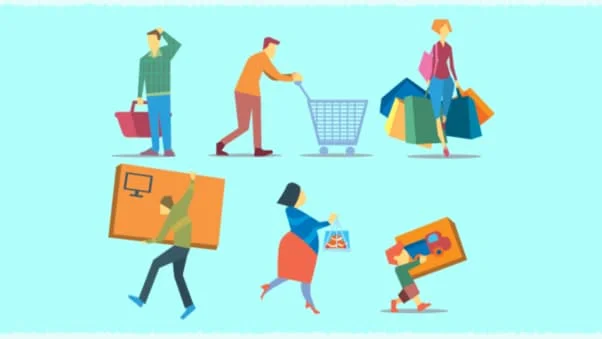Back to: BUSINESS STUDIES JSS2
Welcome to Class !!
We are eager to have you join us !!
In today’s Business Studies class, We will be discussing Shopping Tips. We hope you enjoy the class!

Shopping tips
- Shop with a list
This is my number one tip for good reason. Many people overspend or buy things they don’t want, don’t need and never end up using because they haven’t prepared properly. This is your hard-earned cash and precious time you are spending – it’s worth a few minutes of preparation, don’t you think? Sure, it is (and remember, you’re worth it!). So, before you set off on your shopping trip, prepare. Review what you already have – in your closet, cupboards, home or garage, then write a list of the ‘gaps’ you have and the needs this item will fill. Make sure they are genuine needs – not frivolous wants (there’s a big difference between the two). And finally, remember to use that list when you shop! That list will be no good scrupled up on the bottom of your bag or jammed into your pocket. Use it and only buy things that are on that list!
- Set a budget
Yes, oh yes – the “b” word. Budget. This is important. Many people overspend on things they don’t want, need or use because they had no parameters around their spending – they just went ‘hell for leather’. Not a smart way to shop. You need to set a ballpark figure (or a more precise one if you have the specific research on what you are shopping for to support it) on what you are going to spend on this trip, what is comfortable for you to spend and what makes sense for you to spend on this shopping trip. You want to feel great about this shopping trip long after the ink has faded on the receipt, right? And one way to do that is to make sure you don’t buy more than you can afford. Set your budget – and like the list – stick to it! Whatever your budget – #50 or #500 or #5000 – stop shopping once you hit that limit.
- Pay with cash
The research is clear: we pay 20 – 50% more when we shop with magic plastic, whether it’s using a credit or debit card. There’s something about that magic plastic that can make us feel like we’re using Monopoly money, play money. Like it’s not real. Unfortunately, those credit card fees are very real! So once your list is prepared and you have a realistic budget you can stick to, withdraw your funds in cash and use only that cash for this shopping trip. Paying with cash feels more “real” and that’s what we want – to reconnect you to this shopping experience so you only buy things you genuinely need and will use. You’ll save a fortune and those impulse buys will seem far less alluring!
- Set a timeframe
Don’t allow yourself to meander around a shopping centre in an aimless fashion. Many people use shopping in a loll about fashion, whiling away an afternoon in their favourite mall. Not a strategy I would promote or advocate. If you want to shop smart, this isn’t the way to go – no meandering shopping! Set a specific timeframe that you will complete your shopping in, and once that time is over, it’s time to head home. Your time is too valuable to spend it mindlessly anyway – once you’ve bought all you need (and nothing you don’t), stop shopping and turn your attention to something else for the day.
- Pick the best time for you
Shopping can be a fatiguing and stressful activity if you don’t shop at a time that works well for you. Shopping when the malls and stores are most busy (such as late-night shopping and Saturday mornings) can lead to shopping fatigue where you end up fractious and irritable – not a state in which smart shopping usually takes place. Remember that our physical environment affects us and overcrowded, jostling environments like congested shopping centres rarely bring out the best in anybody. So, pick a time to shop when you are going to be at your most alert and positive. And make sure that you take regular breaks or shop for shorter periods to avoid becoming fatigued.

- Shop alone
Many people find that shopping partners are more akin to accomplices in crime! They can egg us on to making purchases that we don’t want or need, and can have their own (sometimes unconscious) motives for encouraging us to shop. Perhaps they feel some sense of competition, or they want to live vicariously through us and our purchases. Whatever is going on for the other person, what they don’t have to live with is the consequences of your shopping – only you have to live with that. If you want to go shopping as a social activity, that’s okay – but make it a purely social activity with no purchasing allowed. Window shop, or have a bite to eat together but don’t buy until you can go shopping on your own.
- Don’t shop when you are tired, hungry, lonely, bored or upset.
This is not an exhaustive list of the emotional states that lead some people to over shop and end up buying things they don’t want or need. But they are some of the most common emotional triggers that prompt people to shop unconsciously and therefore not smartly. If you are feeling any of those emotions – you are tired, hungry, lonely, bored, and upset – don’t go shopping. Do something else until you feel on more of an emotional even keel.
We have come to the end of this class. We do hope you enjoyed the class?
Should you have any further question, feel free to ask in the comment section below and trust us to respond as soon as possible.
In our next class, we will be talking about Book-Keeping. We are very much eager to meet you there.

Thank you for providing such an informative and well-researched blog post. Your expertise on the subject matter was evident, and I enjoyed learning from your perspective. To gain further insights, click here.
+you did
well
what are objectives of shopping tips